
Around the world, many people who do not identify with any religion nevertheless hold a variety of spiritual and religious beliefs, including the belief that there is life after death, according to a Pew Research Center study of religiously unaffiliated adults in 22 countries.
The number of adults who are religiously unaffiliated – describing themselves as atheist, agnostic or “nothing in particular” – has climbed rapidly in the recent past across North America, Europe, parts of Latin America and some countries in the Asia-Pacific region, such as Australia and South Korea.
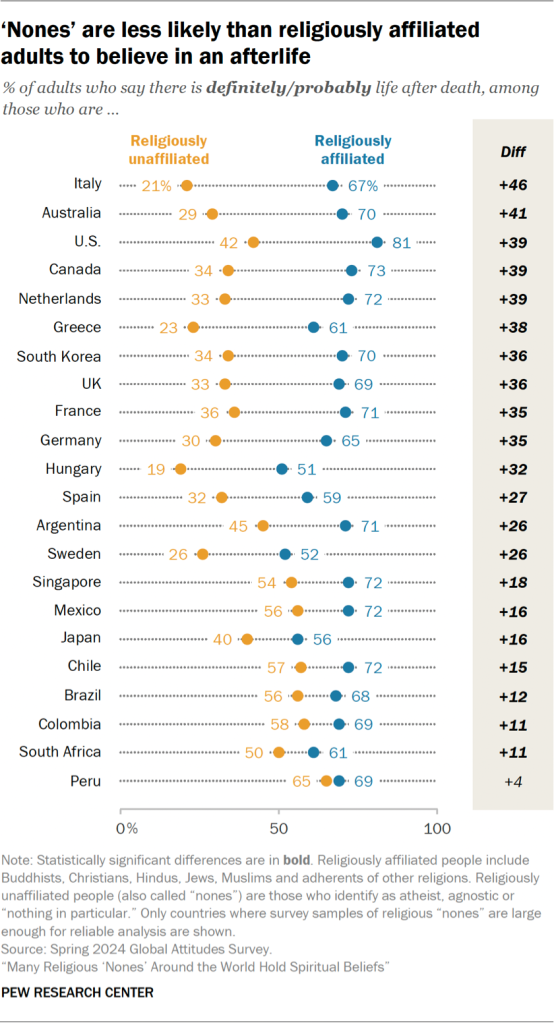
In general, religiously unaffiliated people are less likely to hold spiritual beliefs, less likely to engage in religious practices, and more likely to take a skeptical view of religion’s impact on society than are Christians, Muslims and people who identify with other religions.
But sizable percentages of religiously unaffiliated adults – often called religious “nones” – do hold some religious or spiritual beliefs, according to our nationally representative surveys of 22 countries with relatively large unaffiliated populations.1
For example, in all 22 countries, about a fifth or more of “nones” believe in life after death. The shares who say there is definitely or probably an afterlife range from 19% of unaffiliated adults in Hungary to 65% in Peru.2
In seven of the 22 countries, 50% or more of all “nones” believe in life after death.
In addition, large shares of “nones” in some countries say “there is something spiritual beyond the natural world, even if we cannot see it.” For instance, 61% of “nones” in Mexico and 65% in Brazil express this belief.
Many religiously unaffiliated adults also express belief in God. This includes solid majorities of “nones” in South Africa (77%) and several countries in Latin America, such as Brazil (92%), Colombia (86%) and Chile (69%).3
Religiously unaffiliated adults in Europe and Australia are much less inclined to believe in God. Just 18% of “nones” in Australia, 10% in Sweden and 9% in Hungary are believers.
In the United States, 45% of “nones” say they believe in God, according to our 2023 survey.4

Jump to more on belief in God among “nones” in Chapter 1.
Another relatively common belief among people who do not affiliate with any religion is that animals can have spirits or spiritual energies. In Greece and several Latin American countries, at least three-quarters of “nones” believe this.
It might seem surprising that sizable shares of “nones” express any religious or spiritual beliefs. Yet nonbelief isn’t always the main reason people have no religious affiliation. In a 2023 survey we conducted in the U.S., 30% of “nones” said an extremely or very important reason they are nonreligious is that they have had “bad experiences with religious people,” about the same share who cited nonbelief in God or a higher power as a key reason (32%). Even more “nones” said they are nonreligious because they “don’t like religious organizations” (47%).
How many ‘nones’ are secular?
While sizable shares of “nones” in these 22 countries hold spiritual or religious beliefs, some express a more consistently secular outlook – saying they believe neither in God nor in an afterlife nor that there is “something spiritual beyond the natural world.”
In Sweden, where 52% of adults are religiously unaffiliated, around half of “nones” (or 28% of the total adult population) express nonbelief in all three of these measures. Other places where relatively large shares of adults are “nones” expressing such nonbelief are Australia (24%), the Netherlands (24%) and South Korea (23%).
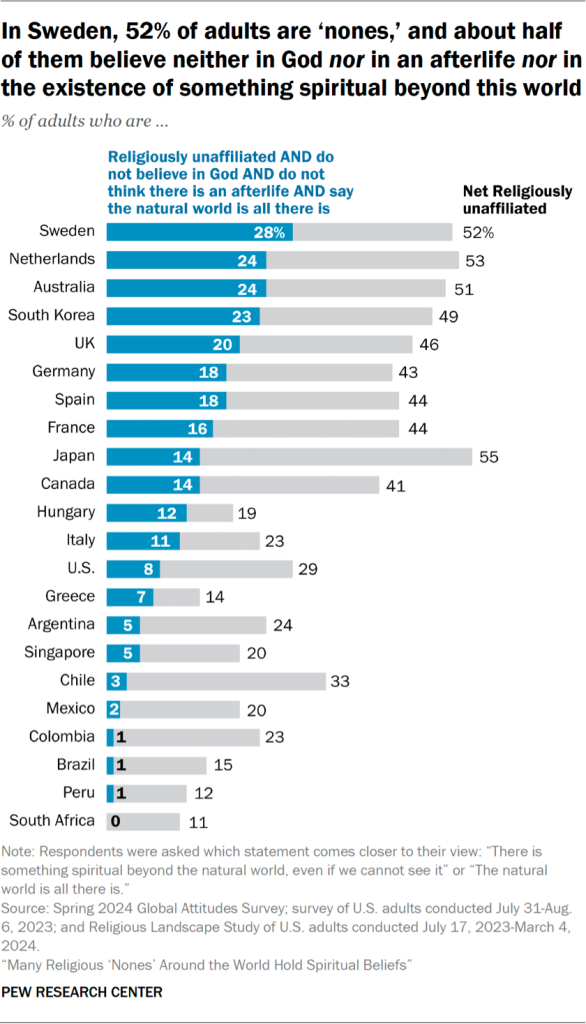
Meanwhile, in several countries in the Americas, a much smaller portion of the population can be described as consistently secular in this way. In Mexico, for instance, 20% of adults are “nones,” but just 2% are “nones” who express nonbelief in the three measures analyzed here.
In the U.S., 29% of adults have no religious affiliation, and “nones” who consistently take secular positions on these three survey questions make up 8% of the U.S. public.
Do ‘nones’ partake in religious practices?
Compared with the large percentages of “nones” who hold religious beliefs, smaller shares tend to engage in the religious practices we asked about in this survey.
For example, only about a fifth or fewer of “nones” say they light incense or candles for spiritual or religious reasons in most of the 22 countries discussed in this report.
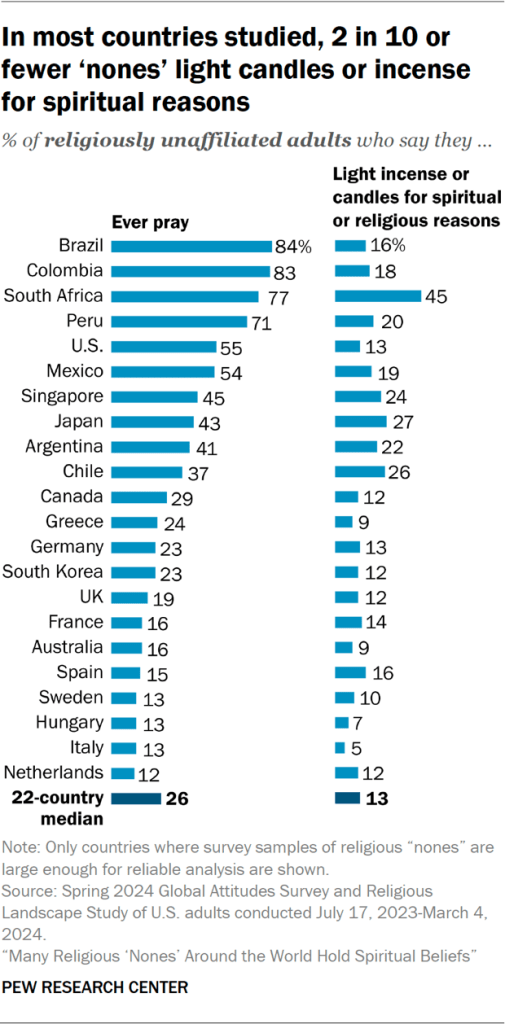
In general, “nones” are somewhat more likely to say they pray than to say they light incense or candles. However, in most of the studied countries, the “nones” who pray tend to report that they do so infrequently – a few times a month or less often.
For example, just 23% of German “nones” say they ever pray. That includes 16% who pray a few times a month or less often, and 7% who say they pray weekly or more often.
Overall, “nones” are much less likely than religiously affiliated adults to engage in these practices. For instance, 72% of Christians in Germany say they ever pray, including 33% who pray at least weekly.
Jump to more on the spiritual and religious practices of “nones,” including attendance at religious services and the use of fortune tellers or horoscopes to see the future, in Chapter 2.
These are among the key findings from a Pew Research Center analysis of 2023-24 surveys conducted in 22 countries with samples of religious “nones” that are large enough to analyze and report separately. We interviewed a total of more than 34,000 respondents in the 22 countries, including more than 10,000 who are religiously unaffiliated.5
The rest of this Overview answers the following questions:
- What are the main subgroups of ‘nones’?
- How important is religion to ‘nones’?
- How do ‘nones’ view religion’s impact on society?
What are the main subgroups of ‘nones’?
In nearly all of the 22 countries analyzed in this report, the largest subgroup of “nones” is people who say their religion is “nothing in particular,” rather than those who identify as atheist or agnostic.6
Indeed, in most of the countries, especially in Latin America and Asia, the percentage of adults who describe their religion as “nothing in particular” is higher than the share of atheists and agnostics combined.
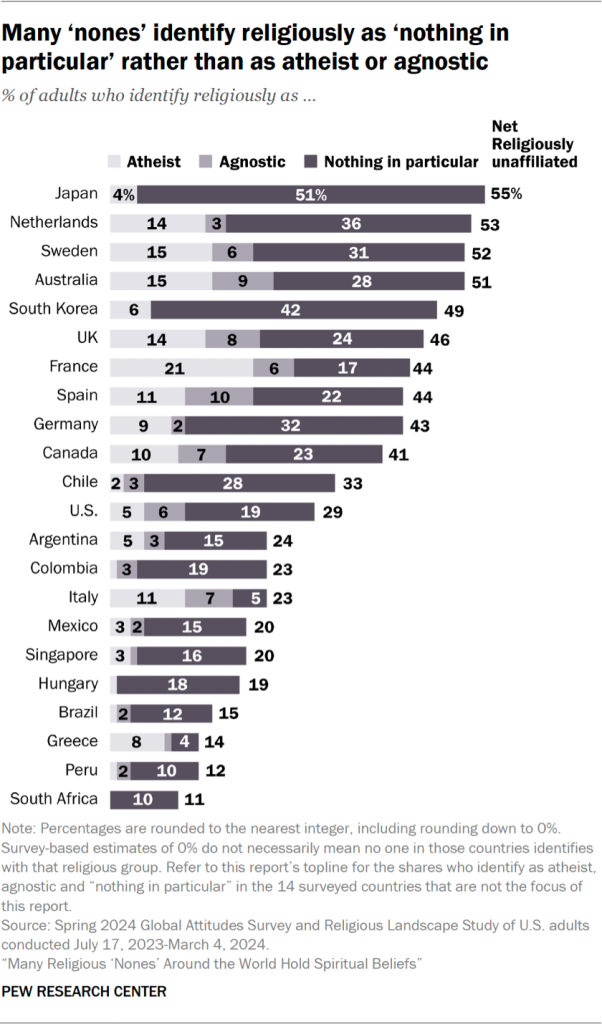
For instance, 12% of adults in Brazil say they have no particular religion, while 2% identify as agnostic and 1% say they are atheist. In Singapore, 16% of adults say their religion is “nothing in particular,” while 3% are atheist and 1% are agnostic.
Of the 22 countries analyzed, only in Greece and Italy is atheism the most common affiliation among “nones.”
Agnostics are the smallest of the three groups that make up the “nones” in 10 of the surveyed countries, including in Australia and several European and Asian countries. In the Netherlands, for example, 36% of adults say they have no particular religion, 14% are atheist and just 3% are agnostic.
Differences in affiliation by age, education and gender
In most of the countries analyzed, adults ages 18 to 39 are much more likely than older adults to identify as “nones.” For instance, 72% of Japanese adults under 40 say they are atheist, agnostic or “nothing in particular,” compared with 50% of older adults.
In general, adults with more education are somewhat more likely than those with less education to be religiously unaffiliated. For example, 28% of Argentine adults who have at least a secondary education are “nones,” compared with 18% of Argentines with less education.7
In nine of the countries analyzed, men are more inclined than women to say they have no religion. In the United Kingdom, for example, 51% of men are “nones,” compared with 40% of women.8
How important is religion to ‘nones’?
Perhaps unsurprisingly, most religiously unaffiliated people feel that religion plays only a minor role in their lives.
The survey offered four options: Respondents could say religion is very important, somewhat important, not too important or not at all important in their lives.
In half of the 22 countries analyzed, at least six-in-ten “nones” give the least religious answer, saying religion is not at all important to them. This includes all the European countries surveyed, as well as Australia and Canada.
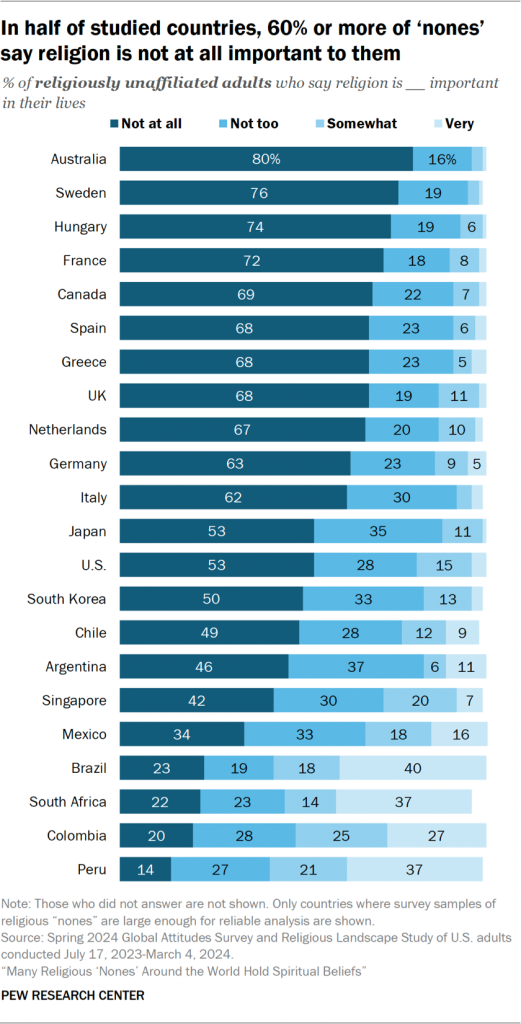
In a few countries, however, about half or more of “nones” say religion is either somewhat or very important in their lives. This is the case in Brazil, Colombia, Peru and South Africa – possibly reflecting the prevalence in these countries of traditional African, Afro-Caribbean, or Indigenous and Indian religious beliefs and practices (even among people who don’t identify with any religion).
“Nones” who say religion is not at all important in their lives are much less likely than other “nones” to hold the various spiritual and religious beliefs we asked about in the survey – sometimes by very wide margins.
For example, in all 15 countries with enough “nones” in both groups to allow reliable comparisons, “nones” who say religion is not at all important are less likely to believe in God than are “nones” who ascribe at least some importance to religion.
For other examples of this divide among “nones,” refer to Chapter 1 (on belief in life after death, ancestral spirits and spirits in parts of nature), Chapter 2 (on frequency of prayer) and Chapter 3 (on saying religion mostly hurts society).
How do ‘nones’ view religion’s impact on society?
Many “nones” express negative views about religion’s influence on society.
For instance, in 12 of the 22 countries studied here, religiously unaffiliated adults are more likely to say religion encourages intolerance than to say it encourages tolerance. In Germany, nearly three-quarters of “nones” say religion encourages intolerance, compared with a quarter who say it encourages tolerance.
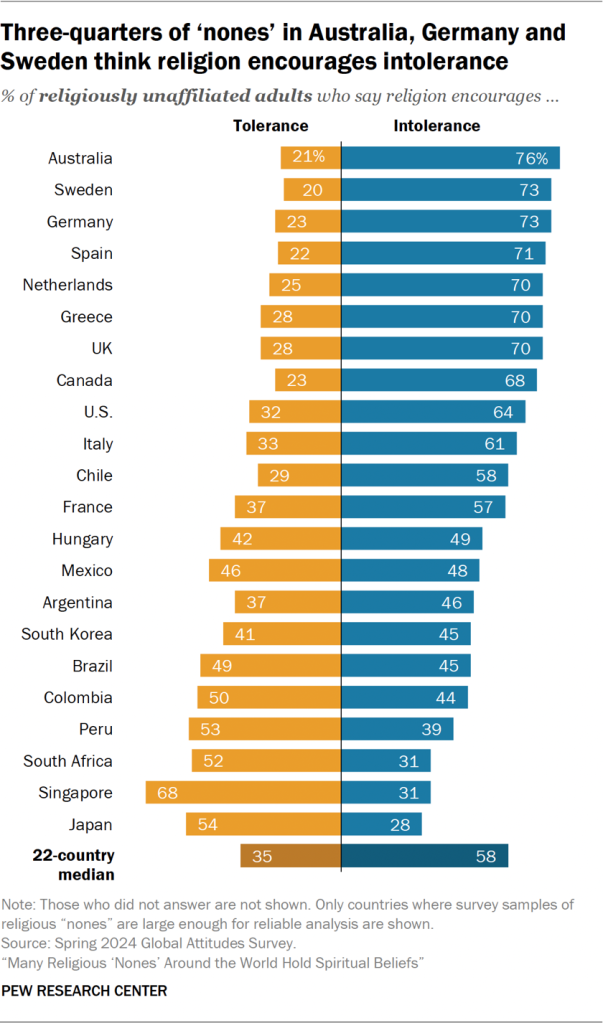
Likewise, in every country with enough religiously unaffiliated adults to analyze, at least half of “nones” say that religion encourages superstitious thinking.
We also asked survey respondents whether religion mostly helps or mostly hurts society. Across the countries surveyed, a median of 53% say religion mostly hurts society, while a median of 38% say it mostly helps.
The views of “nones” toward religion are generally a lot more negative than the corresponding views of people who identify with a religion. In Australia, for example, 76% of “nones” say religion encourages intolerance, compared with 35% of religiously affiliated Australians.
Importance of having national leaders with religious beliefs
Moreover, majorities of “nones” in nearly every country we analyzed do not think it is important for their national leader to have strong religious beliefs.9
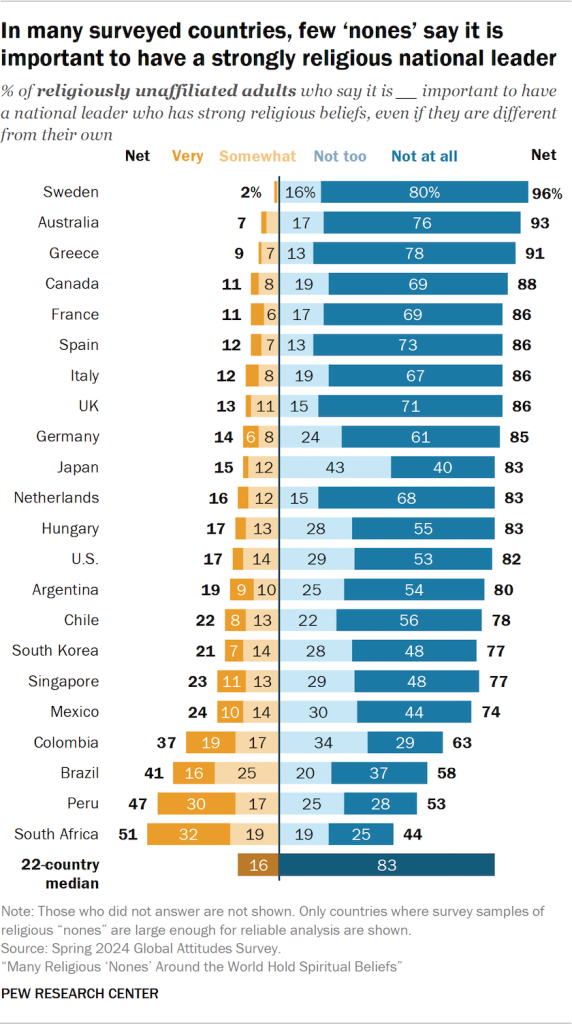
In the UK, for instance, 86% of religiously unaffiliated adults say it is not important to have a prime minister who has strong religious beliefs – including 71% of British “nones” who say this is not at all important for a prime minister.
For more on how religiously unaffiliated adults view religion’s role in society, jump to Chapter 3.





